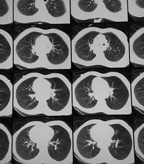HPV Linked to Increased Esophageal Cancer Risk
A meta-analysis by researchers in Australia shows that those infected with the human papillomavirus have a threefold higher risk of developing esophageal squamous cell carcinoma.
A meta-analysis by researchers at the University of New South Wales in Sydney, Australia shows that those infected with the human papillomavirus (HPV) have a threefold higher risk of developing esophageal squamous cell carcinoma (SCC), compared with those who are not infected with the virus. The results of this analysis are published in PLOS One.

Cancer of the esophagus, CT with contrast, axial image.
HPV is a known cause of cervical cancer and other genital cancers, including anal cancer. The viral infection is also the cause of some types of head and neck cancer. However, data on whether HPV is linked to esophageal cancer has thus far been mixed, mostly due to studies that include only a small number of participants.
“This is an important new finding, which resolves a previous uncertainty,” said senior author Raina MacIntyre, head of the School of Public Health and Community Medicine at the University of New South Wales, in a statement.
The analysis included 21 case-controlled studies. Of the 1,223 pooled cases, 35% were positive for HPV DNA. The pooled data included 1,415 controls. The odds ratio for association of HPV with esophageal SCC was 3.04.
The authors state that these results further add “support of HPV vaccination as a cancer-preventing vaccine for children of both genders, to broaden the preventive targets of the vaccine.”
In the United States, adenocarcinoma of the esophagus, the second most common type of esophageal cancer, is more common among blacks, while esophageal SCC is more common among whites. Combined, these two types of esophageal cancer account for approximately 15,000 deaths annually.
Esophageal SCC is the sixth highest cause of death from cancer worldwide (about 406,000 deaths per year). Esophageal SCC is more common than adenocarcinoma of the esophagus; it is particularly prevalent in China, India, and Southern Africa, according to the American Cancer Society.
Other than HPV, heavy alcohol consumption and smoking are risk factors for esophageal cancer. Environmental, lifestyle, and dietary factors are also thought to play a role.
According to lead author Surabhi Liyanage, a PhD candidate with the School of Public Health and Community Medicine, esophageal cancer is typically diagnosed in an advanced form. According to the National Cancer Institute, the 5-year survival rate for advanced esophageal cancer is only 3.5%.
HPV Vaccination of Boys Is Important for Prevention
Vaccinations against HPV infection are currently available around the world. In the United States, the vaccination is recommended for girls and boys starting at age 11 by the Centers for Disease Control and Prevention (CDC). The most robust evidence for the importance of the HPV vaccine is the prevention of cervical cancer. Data that these vaccinations prevent HPV infection that can lead to other types of cancers, including head and neck and anal cancers, are increasing.
A meta-analysis from researchers at the University of Toronto, published in the journal Sexually Transmitted Infections, shows that boosting rates of HPV vaccination in both boys and girls is necessary to protect the population against HPV.
Currently two prophylactic HPV vaccines are available: Cervarix, a bivalent vaccine that immunizes against two oncogenic HPV types; and Gardasil, a quadrivalent vaccine that immunizes against two oncogenic HPV types, as well as two HPV types that cause genital warts but are not linked to cancer development. Currently, most countries target girls for vaccination instead of boys. The exception is Australia-while teenage girls have been vaccinated since 2007, it will also be the first country to vaccinate boys through a school program that is funded by the Australian government.
The CDC recommends that women (up to age 26), straight men (up to age 21), and all gay and bisexual men should also receive the vaccine.
HPV is common; almost all women and men who are sexually active will become infected at some point during their lives, according to the CDC. About 79 million people in the United States are currently infected with HPV, and an additional 14 million are infected annually.
The University of Toronto study analyzed 16 studies of 5,048 people to understand the factors that determine whether boys and men receive the HPV vaccination. Lead author of the study, Peter A. Newman, PhD, professor of social work, and colleagues found that the main factor that negatively affects the decision to be vaccinated is the lack of data that directly links HPV infection in men with life-threatening cancer.
According to the authors, the results show that promoting vaccination for boys and young men, as well as “targeting messaging for young men who have sex with men to support perceived HPV vaccine benefits and effectiveness, and accurate perceptions of HPV risk may increase acceptability.”
According to the authors, physicians and other health caretakers need to better communicate the health benefits of the HPV vaccine for men, in addition to women.
Progress Reported in Advanced Esophageal Cancer
June 7th 2010Meeting podcast: Listen to nationally regarded GI cancer specialist and clinical researcher, Peter C. Enzinger, MD, Assistant Professor of Medicine, Dana-Farber Cancer Institute, discuss new developments and trends in the management of esophageal cancer.